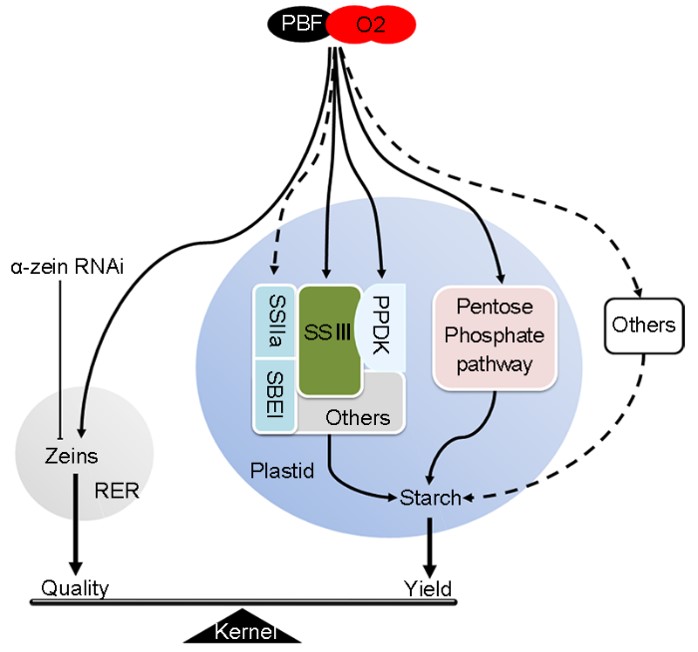Scientists Discover a Network Node in Regulation of Nutritional Quality and Yield in Corn
On Sep 12, 2016, Proceedings of the National Academy of Sciences of the United States of America (PNAS) online published a research paper entitled “Maize endosperm-specific transcription factors O2 and PBF network the regulation of protein and starch synthesis” from Prof. Yongrui Wu’s group at Shanghai Institute of Plant Physiology and Ecology (SIPPE) in cooperation with Prof. Joachim Messing’s group at Waksman Institute of Microbiology, Rutgers University, USA.
Corn is one of the most important crops for food and livestock. The improvement of nutritional quality and yield are equally important for the corn breeding. In general, corn’s nutritional quality is poor because its main storage protein named zein is devoid of two essential amino acids, lysine and tryptophan. Previous studies have shown that O2 and PBF encode two endosperm-specific transcription factors for zein gene expression. The classic opaque2 (o2) mutant exhibits high seed nutritional value by reducing the amount of zein proteins. Unfortunately, in practical applications, the o2 mutant also has multiple agronomic defects such as soft texture and low yield. To overcome this, corn breeders have generated the quality protein maize (QPM) in the o2 mutant background. However, the low yield of QPM precludes its wide use.
This study reports that the nutritional quality and yield traits are tightly linked through the same transcription factors, PBF and O2. Transcriptome and immunoblot analyses find that both PBF knock-down plants and the o2 mutant show altered expression of several major enzymes of starch synthetic complex in amyloplasts, including PPDKs, SSIII, SSIIa and SBEI. Molecular and biochemical experiments further prove that PBF and O2 directly modulate starch synthesis by activating PPDKs and SSIII. In addition, this study also finds that these two transcription factors regulate the expression level of the genes in pentose phosphate pathway, which are involved in starch synthesis in the endosperm. Thus, these results together reveal the molecular basis for the reduction of starch synthesis and kernel weight in the o2 mutant and suggests that the future QPM breeding program could increase corn yield and quality simultaneously by specifically knockdown the expression of zein genes rather than that of O2.
This research was supported by the grants from NSFC (31371630, 91335109 and 31422040), the grants from CAS (XDA08020107), CAS center for excellence in Molecular Plant Sciences and Thousand Talents Program.
CONTACT:
Dr. Yongrui Wu, PhD, Professor
Institute of Plant Physiology & Ecology (SIPPE)
Shanghai Institute for Biological Sciences (SIBS)
Chinese Academy of Sciences
300 Fenglin Road
Shanghai 200032, China
+86-21-54924341 (Tel)
Labweb: http://sippe.ac.cn/wyr

Figure 1. A proposed model for O2 and PBF controlling kernel nutritional quality and yield in corn.
